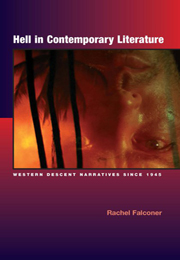Book contents
- Frontmatter
- Contents
- Acknowledgements
- Introduction: Descent and Return – the katabatic imagination
- 1 Hell in Our Time
- 2 Chronotopes of Hell
- 3 Auschwitz as Hell
- 4 Surviving with Ghosts: Second-generation Holocaust Narratives
- 5 Katabatic Memoirs of Mental Illness
- 6 Engendering Dissent in the Underworld
- 7 Postmodern Hell and the Search for Roots
- 8 East-West Descent Narratives
- Epilogue: Katabasis in the Twenty-First Century
- Appendix: Primo Levi, ‘Map of reading’
- Bibliography
- Index
7 - Postmodern Hell and the Search for Roots
Published online by Cambridge University Press: 12 September 2012
- Frontmatter
- Contents
- Acknowledgements
- Introduction: Descent and Return – the katabatic imagination
- 1 Hell in Our Time
- 2 Chronotopes of Hell
- 3 Auschwitz as Hell
- 4 Surviving with Ghosts: Second-generation Holocaust Narratives
- 5 Katabatic Memoirs of Mental Illness
- 6 Engendering Dissent in the Underworld
- 7 Postmodern Hell and the Search for Roots
- 8 East-West Descent Narratives
- Epilogue: Katabasis in the Twenty-First Century
- Appendix: Primo Levi, ‘Map of reading’
- Bibliography
- Index
Summary
In Alasdair Gray's Lanark, the ceiling of artist Duncan Thaw's studio is scrawled with quotations, two of which read:
GOING DOWN TO HELL IS EASY: THE GLOOMY DOOR IS OPEN NIGHT AND DAY. TURNING AROUND AND GETTING BACK TO SUNLIGHT IS THE TASK, THE HARD THING.
VergilHUMANITY SETS ITSELF NO PROBLEM WHICH CANNOT EVENTUALLY BE SOLVED
Marx (Lanark, p. 283)Gray yokes together Virgil and Marx (along with Freud, Dante, Blake and many other katabatic luminaries) in order to underline the ways in which postmodern capitalism may be understood as a contemporary, secular form of Hell. In the other narrative strand of this mammoth, passionately socialist, sardonically self-questioning novel, the hero Lanark lives in a dystopian city without sunlight or love. The task he sets himself is to understand how the city came to be like this, and how it, or he, can be returned to the ordinary paradise he sometimes remembers from an earlier life. Lanark's Unthank is a fantastical, futuristic version of Thaw's 1950s Glasgow, which Gray represents as similarly lacking in human affection, freedom and creativity. As his name suggests, Thaw's task is to release the frozen core of humanity in himself and his environment. He proves to be a spectacular failure in this, and his alter ego, or perhaps post-ego, Lanark fares little better. And yet the novel as a whole is richly affirmative of ordinary virtues and pleasures: individual autonomy, breathable air, the affection between a father and son, light and architectural grace.
- Type
- Chapter
- Information
- Hell in Contemporary LiteratureWestern Descent Narratives since 1945, pp. 172 - 195Publisher: Edinburgh University PressPrint publication year: 2004



